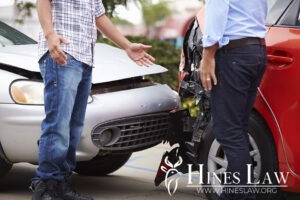Car wrecks are hard enough to deal with without making a mistake that will make them even more complicated in the immediate moment or lingering aftermath. Here are nine precautions about things to avoid.
1. Don’t leave the scene

Fleeing the scene of an accident is a crime — even minor ones. Don’t make a situation that can already be complicated harder by leaving the scene. Beyond potential criminal charges, your vehicle may be damaged and driving away may be unsafe.
2. Don’t lose your head
Feeling anxious, afraid, worried, and even angry is normal — especially if the car wreck was a risky one or injuries were sustained. It may be difficult to keep emotions under control, but it’s still essential to be able to get through the aftermath calmly and carefully.
3. Don’t forget to call 911
Except in the most innocent and fleeting of circumstances involving the most minor vehicle damage — think of parking-lot-fender-benders — don’t forget to call 911. It’s especially important to contact 911 to activate emergency responses to the motor vehicle collision if there is even the slightest risk of personal injury, significant property damage, or implications affecting third parties not directly involved in the collision. When in doubt, call 911.
4. Don’t admit responsibility for the accident… to anyone
The time will come when responsibility for causing the accident and any injuries or damages will need to be determined. The immediate aftermath of the road accident is not that time, and you are not the person responsible for making that assessment. Even if you feel responsible, don’t accept, claim, or assign responsibility. Issues of causation and liability can be complicated, and you need to get careful legal advice before responding to such issues. This includes telling your insurer that you were responsible. Hold your tongue.
5. Don’t fail to collect available information
Don’t forget to gather the names and contact information for any witnesses to the accident — they may be uninvolved drivers or pedestrians nearby. When it comes to other drivers involved in the accident, be sure to obtain their full name, contact information (telephone number, email address, mailing address, for example), name of insurer, and policy number.
6. Your best tool for gathering information is your phone.
Take pictures of the location of the accident, including the roadway, shoulders, medians, weather conditions, signs, vehicles, damage, debris, and injuries. When it comes to collecting insurance information, take the time to photograph the paperwork rather than relying on eyesight or memory in a stressful situation.
7. Don’t forget to call your insurer
As soon as you can safely call your insurer, call them to start the claim process. Provide accurate and complete information in response to their queries but be careful to avoid taking blame. Do not provide any recorded or written statements to any insurance investigator until after obtaining legal advice.
8. Don’t make assumptions about your well-being
You may feel fine, but circumstances can change in the hours and days following an accident. As soon as possible, go see your doctor and explain exactly what happened in the accident. Your doctor will perform a full examination and series of tests to ensure you recover from any injuries as quickly and completely as possible, and to give your legal advisers any information they need to protect your future legal interest.
9. Don’t forget to call a lawyer
There are very good reasons why personal injury litigation is common. It’s because the legal issues that can arise from a motor vehicle accident are many, various, and complicated. Before signing anything and as soon as possible after dealing with the immediate aftermath of the accident and any urgent medical issues, contact a legal advisor for advice and support to protect your interests.
There’s nothing easy or simple about motor vehicle accidents. But you can simplify the process of getting through and past a car crash by taking these recommendations to heart.
